【8A版】初中英语动词讲解与练习
- 格式:doc
- 大小:23.01 KB
- 文档页数:3
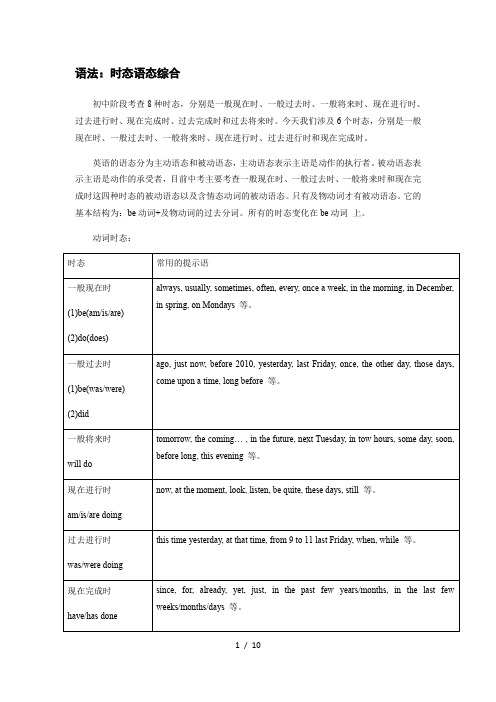
语法:时态语态综合初中阶段考查8种时态,分别是一般现在时、一般过去时、一般将来时、现在进行时、过去进行时、现在完成时、过去完成时和过去将来时。
今天我们涉及6个时态,分别是一般现在时、一般过去时、一般将来时、现在进行时、过去进行时和现在完成时。
英语的语态分为主动语态和被动语态,主动语态表示主语是动作的执行者。
被动语态表示主语是动作的承受者,目前中考主要考查一般现在时、一般过去时、一般将来时和现在完成时这四种时态的被动语态以及含情态动词的被动语态。
只有及物动词才有被动语态。
它的基本结构为:be动词+及物动词的过去分词。
所有的时态变化在be动词上。
动词时态:动词语态注意以下几种被动语态的特殊情况:一.被动语态中不定式要还原Let/make/see/hear/watch sb. do sth.----- sb. be let/made/seen/heard/watched to do sth.My mother made me look after the little sister yesterday.----I was made to look after the little sister by my mother yesterday.二.有些动词没有被动语态。
(及物动词才有被动语态)1) 不及物动词或动词短语无被动语态:appear, die,disappear, end (vi. 结束), fail, happen, last, lie, remain, sit, spread, stand break out, come true, fall asleep, keep silence, lose heart, take place.2) 系动词无被动语态:appear, be,become, fall, feel, get, grow, keep, look, remain, seem, smell, sound, stay, taste, turn3) 不能用于被动语态的及物动词或动词短语:fit, have, hold, marry, own, wish, cost, notice, watch,agree with, arrive at / in, shake hands with, succeed in, suffer from, happen to, take part in, walk into, belong to4) 系动词无被动语态:appear, be,become, fall, feel, get, grow, keep, look, remain, seem, smell, sound, stay, taste, turn5) 当宾语是不定式时,很少用于被动语态。

语法:动词不定式动词不定式是一种非谓语动词,其结构为“(to) + 动词原形”。
动词不定式的用法:1. 作宾语不定式常用作某些动词的宾语, 如want, hope, wish, agree, learn, like, love, offer(表示要),plan, promise, remember, forget, try(努力), decide(决定), begin, start等。
例如:She wanted to buy a few postcards. 她想买几张明信片。
The car repairer began to check my car. 汽车修理工开始检查我的汽车。
It started to snow at midnight. 半夜里开始下雪了。
在某些动词如know, learn, decide, wonder(想知道),remember, forget, tell, show, teach等后,还可以接“疑问词+ to不定式”。
例如:I didn’t know what to say to him. 我不知道对他说什么好。
They are learning how to use the computer. 他们正在学习怎样使用电脑。
Did they tell you where to go? 他们告诉你去哪儿吗?The farmer showed us how to cut rice. 农民教我们怎样割稻。
● 动词不定式作宾语与动名词作宾语辨析⑴在动词want, wish, hope, decide, help, promise, plan, manage, agree等后只能用动词不定式作宾语,而在动词dislike, keep, finish, mind(介意),practice(练习),enjoy等后只能用动名词作宾语。
例如:We promise to keep our classroom clean all the time. 我们答应始终保持我们的教室清洁。

新译林8A英语UNIT 5单元知识点归纳及练习题8A Unit 5 Wild Animals一、词汇大集合the daytime 在白天way不可能/take pity on sb.同情某人through the winter 冬眠fact 实际上,事实上the beginning 一开始, 起初(at first) in the beginning 一般不与of连用。
◇at the beginning 常与of 连用,表“在...之初”◇at the beginning 也可单独使用,表示“起初,开始”,这时可与in the beginning替换。
mainly on … 主要以...为生危险n. dangerous 危险的adj.be in danger 处于危险中;animals in danger 处境危险的动物;be out of danger 脱离危险9. take action= do something 采取措施/ 行动away = at once = right now 立刻, 马上birth 出生时,诞生时lost =lose one ’s way 迷路same ...as 与... 一样She has the same book as you.a living 谋生, 维持生计in the wild 在野外time 在任何时候;随时just 100 grams 只重100克to go outside for the first time 开始第一次走到外面four months old 在四个月大时months later 八个月之后… any more = no more不再serious problems 面临严重的问题23. a special kind of…. 一种特殊的...anything special 一些特别的事25.不定式做后置定语:have a place to live, have some food to eat,have books to read, have some rooms to cleanmore panda reserves 建更多熊猫保护区laws制定法律;lawyer 律师nothing 不采取措施;什么都不做into the world 来到这个世界their lives 在他们一生中towards … 朝...走去afraid of sth. 害怕某事/物be afraid of doing sth. 害怕做某事be afraid to do sth. 不敢做某事with one’ s eyes closed 闭着眼站着around 跳来跳去out easy maths problems 解决/做出简单的数学题the help of 在...的帮助下some food 储存一些食物save v. 储存;救;节约a short while 片刻/ 很短时间able to能够ability n. 能力them for their fur, bones or other parts of the body.捕捉他们以获得他们的皮毛、骨头或身体的其他部位as a team 团队合作/团队协作living areas 丧失居住地dangerous to humans 对人类有危险things far away 闻到远处的东西for fun 为了寻乐而杀戮47. lose one’s life 丢掉性命animals’ fur 卖动物皮毛to do sth. = take action to do sth行动起来去做某事to protect wild animals行动起来保护野生动物their own families 拥有他们自己的家庭report on an animal in danger 关于一种处境危险的动物的一则报告二、句型大集合are the kings of the animal world. 狮子是动物界的王者。

Unit 2 School life词句精讲精练词汇精讲1. have tohave to意为“不得不,必须”,表示客观情况要求某人必须做某事,有人称和时态的变化,后接动词原形。
例如:She isn’t very well these days and she has to stay at home.她这些天身体不太好,不得不待在家里。
You don’t have to tell me this. 你不必告诉我这件事。
Do you have to do everything? 什么事都得你做吗?She doesn’t have to come this afternoon. 今天下午她不必来。
【拓展】must与have to的辨析:have to侧重于客观需要,含有“不得不”或“被迫”之意,有多种时态形式;否定式为don’t have to 意为“不必”。
must侧重于说话者的主观看法,认为有必要或有义务去做某事;只有现在时一种形式(在宾语从句中可以表示过去);否定式mustn’t 意为“一定不要;不允许”。
例如:You must do your homework first. 你必须先做作业。
It’s raining. I have to stay at home. 正在下雨,我不得不待在家里。
口诀:“主观职责”说“必须”,must赶紧用上去;若是“环境”“不得不”,赶紧换用have to。
2. fewerfewer意为“更少的”,是few的比较级形式。
例如:Fewer people study Latin today than before. 现在学拉丁语的人比以前少了。
【拓展】a few/ a little; few/little的辨析:例如:We have little time to do it. 我们几乎没有时间来做这件事。
He is new here. So he has few friends. 他是新来的,所以几乎没有朋友。
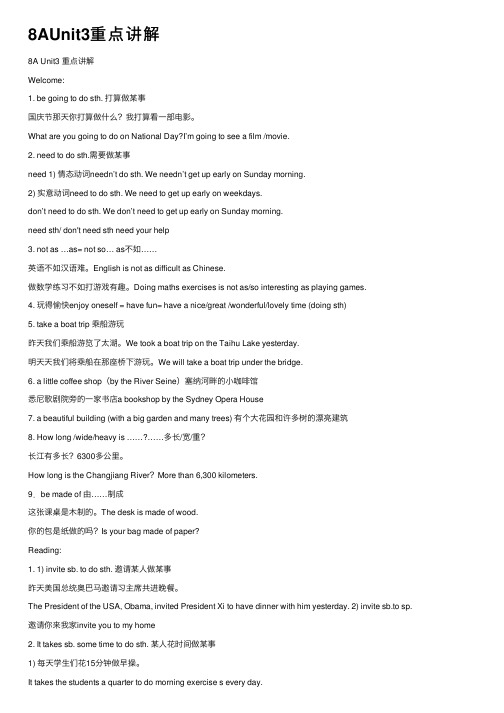
8AUnit3重点讲解8A Unit3 重点讲解Welcome:1. be going to do sth. 打算做某事国庆节那天你打算做什么?我打算看⼀部电影。
What are you going to do on National Day?I’m going to see a film /movie.2. need to do sth.需要做某事need 1) 情态动词needn’t do sth. We needn’t get up early on Sunday morning.2) 实意动词need to do sth. We need to get up early on weekdays.don’t need to do sth. We don’t need to get up early on Sunday morning.need sth/ don't need sth need your help3. not as …as= not so… as不如……英语不如汉语难。
English is not as difficult as Chinese.做数学练习不如打游戏有趣。
Doing maths exercises is not as/so interesting as playing games.4. 玩得愉快enjoy oneself = have fun= have a nice/great /wonderful/lovely time (doing sth)5. take a boat trip 乘船游玩昨天我们乘船游览了太湖。
We took a boat trip on the Taihu Lake yesterday.明天天我们将乘船在那座桥下游玩。
We will take a boat trip under the bridge.6. a little coffee shop(by the River Seine)塞纳河畔的⼩咖啡馆悉尼歌剧院旁的⼀家书店a bookshop by the Sydney Opera House7. a beautiful building (with a big garden and many trees) 有个⼤花园和许多树的漂亮建筑8. How long /wide/heavy is ……?……多长/宽/重?长江有多长?6300多公⾥。

8AU1 Friends【单词】1.nothing pron. 没有东西,没有事情表示否定,nothing=not anything2.good-looking adj. 好看的,连字符构成形容词3.humour n. 幽默(形容词humourous,幽默的)He has a good sense of humour.(幽默感)=He is humourous.4.bored adj. 无聊的(指人感到无聊,主语为人)eg:I feel bored.我感到无聊。
boring adj. 无聊的(令人无聊的,主语可以是物也可是人)eg:The film is boring. 这个电影太无聊了。
5.height n. 高,高度,身高Eg:What is your height?=How tall are you?你多高?6.weight n. 重,体重What is your weight?= How much do you weigh? 你多重?7.比赛- Race 比速度- Match 是两个人或两个队之间的比赛- Contest 一般是比技术或能力(由裁判打分)- Competition 可以是所有的比赛,包括系列性比赛。
【词组句型】1.have something to drink 喝点东西2.some more food 再多一些的食物more是形容词,意为“额外的”做“还,再”解。
常位于数次或any,some,no,a few,a little,many,much,a lot 等表示程度的词或词组后,表示在原有数量的基础上,“再,进一步”增加的量。
注意:当more 前是数词时,可以用anther进行替换时,如: ten more minutes= anther ten minutesEg: I have two more questions to ask.3.nothing else没有别的东西(形容词修饰不定代词放后)4.征求意见What about+sth./doing sth.How about+ sth./doing sthShall we + do sthLet’s + do sthWhy not + do sthWhy don’t you+ do sthYou’d better + do sth5.keep secrets for sb. 为某人保守秘密6.What makes your friend so special ? 什么使你的朋友如此特别?句中的make是使役动词,Make 用作使役动词通常有以下几种形式:(1)接形容词,表示“使某人或某事变得怎样”Eg The news made us excited. 这个消息使我们很兴奋。
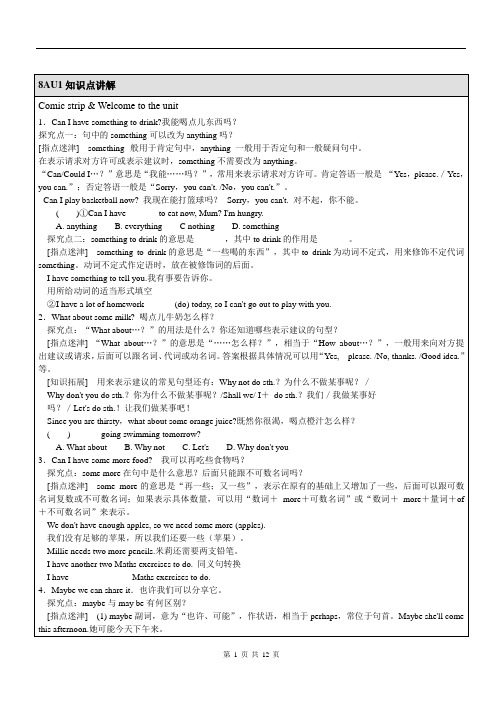
写出下列形容词的比较级和最高级
①important_______ _______ ②hot_______ _______
③busy_______ _______ ④popular_______ _______
⑤sad_______ _______ ⑥fine_______ _______
⑦exciting_______ _______ ⑧thin_______ _______
探究点二:形容词的比较级和最高级有何用法?
[指点迷津] 在没有作任何比较时,用形容词原级;将两个人或事物进行比较时用形容词的比较级+than;将两个以上的人或事物进行比较时用the+形容词的最高级+比较范围。
He is very tall.
他很高。
(没有作任何比较用形容词原级tall)
He is taller than I.
他比我高。
(两者进行比较时用形容词的比较级taller+than)
He is the tallest of us three.
他是我们三个人中最高的。
(两者以上进行比较时用形容词的最高级the tallest+比较范围)
用所给单词的适当形式填空
⑨My room is_______(big).
⑩My brother is_______ (strong) than me.
(11)This pair of trousers is_______(expensive) in the shop.
即时练习
( )1. Liuzhou is_______ than Shanghai.。

Unit 1 of 8A FriendExercise 1 of Unit 1 of 8A Welcome to the unit一、动词填空:1 When the old man saw the photo, he ____ (think) of his happy time many years ago.2. My Maths teacher likes telling interesting stories and always ____ (make) us happy.3. –I heard Daniel ____ (not pass) the maths exam. __Oh, really?4. The baby ____ (cry) in the bedroom. Can you do something to make him laugh?5. Just a minute. He ____ (come) back soon.6. –Look! How fast Wang Ming is running!--I ____ (not know) he could run so fast!7. It's sunny today. How about ____ (fly) kites in the open field?8. There are lots of beautiful flowers at the slow ____ (enjoy).二、完成句子:1、再来一块披萨怎么样?___________________________________2、我想要父母一起分享快乐。
___________________________________3、他总是撒谎,不要相信他的话。
___________________________________4、考试不及格让我不开心。
___________________________________5、你经常关系你的弟弟吗?___________________________________6、--是什么使George成了你最好的朋友?--他有礼貌,乐于助人,幽默,常给我讲滑稽的笑话。

牛津英语8A Unit8 Grammar 专项讲解一、定义过去进行时,是表示过去某个具体时刻正在进行的事情或动作。
二、结构was/were +doing (现在分词)2.1 过去进行时的构成肯定句:主语+ was/were + 现在分词...否定句:主语+ was/were + not + 现在分词...疑问句:Was/Were + 主语+ 现在分词...?疑问代词/疑问副词+ was/were + 主语+ 现在分词...?2.2 过去进行时的肯定句句型:主语+ was/were + 现在分词...过去进行时的构成方式:All the pupils were writing their homework in the classroom then.那时,所有的小学生都在教室里写作业。
By the time we got there,it was already getting dark.等我们赶到那里时,天已经黑下来了。
2.3 过去进行时的否定句句型:主语+ was/were + not + 现在分词...过去进行时的否定句是在助动词was/were后加not,后接现在分词:They were not playing basketball,but playing volleyball.他们不是在打篮球,而是打排球。
2.4 过去进行时的一般疑问句句型:Was/Were + 主语+ 现在分词...?回答方式:Yes,主语+ was/were...No,主语+ was/were + not...过去进行时的一般疑问句是将助动词was/were置于主语之前(大写was/were的第一个字母),在句尾加问号;这种语序是主语和谓语倒装语序:Were you having dinner when they came? —Yes,we were./No,we weren't.他们来的时候,你们是否在吃饭? ——是的,在吃饭。
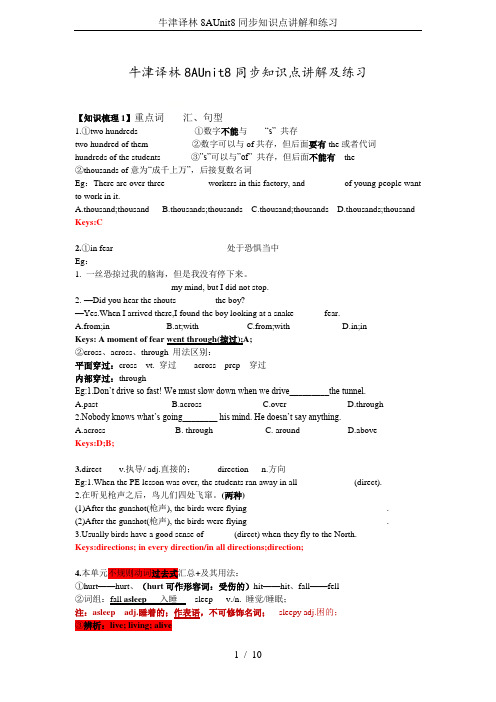
牛津译林8AUnit8同步知识点讲解及练习【知识梳理1】重点词汇、句型1.①two hundreds ①数字不能与“s” 共存two hundred of them ②数字可以与of共存,但后面要有the或者代词hundreds of the students ③”s”可以与”of” 共存,但后面不能有the②thousands of意为“成千上万”,后接复数名词Eg:There are over three__________workers in this factory, and_________of young people want to work in it.A.thousand;thousandB.thousands;thousandsC.thousand;thousandsD.thousands;thousand Keys:C2.①in fear 处于恐惧当中Eg:1. 一丝恐掠过我的脑海,但是我没有停下来。
______________________my mind, but I did not stop.2.—Did you hear the shouts_________the boy?—Yes.When I arrived there,I found the boy looking at a snake_______fear.A.from;inB.at;withC.from;withD.in;inKeys: A moment of fear went through(掠过);A;②cross、across、through 用法区别:平面穿过:cross vt. 穿过across prep 穿过内部穿过:throughEg:1.Don’t drive so fast! We must slow down when we drive_________the tunnel.A.pastB.acrossC.overD.through2.Nobody knows what’s going________ his mind. He doesn’t say anything.A.acrossB. throughC. aroundD.aboveKeys:D;B;3.direct v.执导/ adj.直接的;direction n.方向Eg:1.When the PE lesson was over, the students ran away in all_____________(direct).2.在听见枪声之后,鸟儿们四处飞窜。
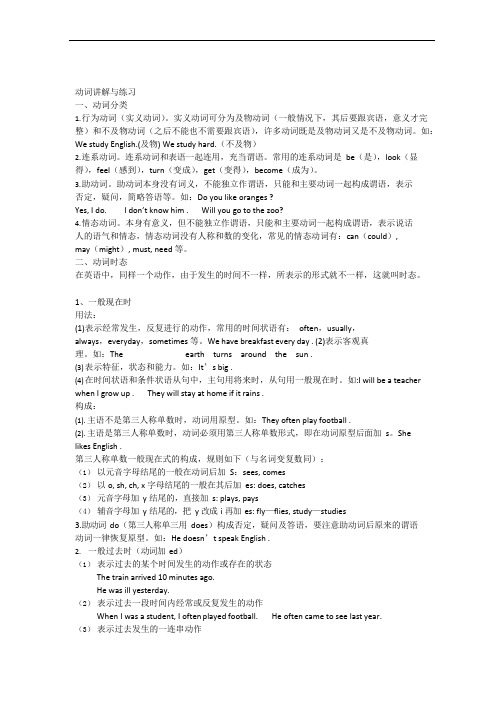
动词讲解与练习一、动词分类1.行为动词(实义动词)。
实义动词可分为及物动词(一般情况下,其后要跟宾语,意义才完整)和不及物动词(之后不能也不需要跟宾语),许多动词既是及物动词又是不及物动词。
如:We study English.(及物) We study hard.(不及物)2.连系动词。
连系动词和表语一起连用,充当谓语。
常用的连系动词是be(是),look(显得),feel(感到),turn(变成),get(变得),become(成为)。
3.助动词。
助动词本身没有词义,不能独立作谓语,只能和主要动词一起构成谓语,表示否定,疑问,简略答语等。
如:Do you like oranges ?Yes, I do. I don’t know him . Will you go to the zoo?4.情态动词。
本身有意义,但不能独立作谓语,只能和主要动词一起构成谓语,表示说话人的语气和情态,情态动词没有人称和数的变化,常见的情态动词有:can(could),may(might), must, need 等。
二、动词时态在英语中,同样一个动作,由于发生的时间不一样,所表示的形式就不一样,这就叫时态。
1、一般现在时用法:(1)表示经常发生,反复进行的动作,常用的时间状语有:often,usually,always,everyday,sometimes 等。
We have breakfast every day . (2)表示客观真理。
如:The earth turns around the sun .(3)表示特征,状态和能力。
如:It’s big .(4)在时间状语和条件状语从句中,主句用将来时,从句用一般现在时。
如:I will be a teacher when I grow up . They will stay at home if it rains .构成:(1).主语不是第三人称单数时,动词用原型。
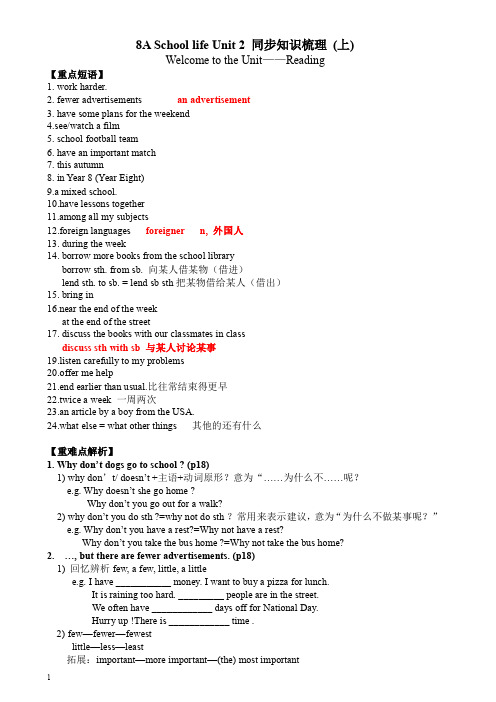
8A School life Unit 2 同步知识梳理(上)Welcome to the Unit——Reading【重点短语】1. work harder.2. fewer advertisements an advertisement3. have some plans for the weekend4.see/watch a film5. school football team6. have an important match7. this autumn8. in Year 8 (Year Eight)9.a mixed school.10.have lessons together11.among all my subjects12.foreign languages foreigner n, 外国人13. during the week14. borrow more books from the school libraryborrow sth. from sb. 向某人借某物(借进)lend sth. to sb. = lend sb sth把某物借给某人(借出)15. bring in16.near the end of the weekat the end of the street17. discuss the books with our classmates in classdiscuss sth with sb 与某人讨论某事19.listen carefully to my problems20.offer me help21.end earlier than usual.比往常结束得更早22.twice a week 一周两次23.an article by a boy from the USA.24.what else = what other things 其他的还有什么【重难点解析】1. Why don’t dogs go to school ? (p18)1) why don’t/ doesn’t +主语+动词原形?意为“……为什么不……呢?e.g. Why doesn’t she go home ?Why don’t you go out for a walk?2) why don’t you do sth ?=why not do sth ?常用来表示建议,意为“为什么不做某事呢?”e.g. Why don’t you have a rest?=Why not have a rest?Why don’t you take the bus home ?=Why not take the bus home?2. …, but there are fewer advertisements. (p18)1) 回忆辨析few, a few, little, a littlee.g. I have ___________ money. I want to buy a pizza for lunch.It is raining too hard. _________ people are in the street.We often have ____________ days off for National Day.Hurry up !There is ____________ time .2) few—fewer—fewestlittle—less—least拓展:important—more important—(the) most importantA. more funny; lessB. more funny; fewerC. funnier; lessD. funnier; fewer( )7. _______ the street, there is a big supermarket.A. In the endB. In the end ofC. At the endD. At the end of ( )8. He said playing computer games _______him lots of time.A. paidB. spentC. tookD. cost( )9.一Shall we go to see a film this evening?一__________A.I’d love to B.You’re right C.Not at all D.A good idea ( )10.一What’s your best friend like?一__________A.He is fine.Thank you B.He is a doctorC.He likes watching TV D. He is helpful and generous( )11.John is _______ Grade 8 _______ No.2 Middle School.A. in; atB. at, inC. in; inD. at, at( )12. _______ people prefer tea while _______ people prefer coffee.A. Britain; AmericanB. Britain; AmericaC. British; AmericanD. British; America ( )13. They usually get there a little _______ than we _______.A. early; getB. earlier; doC. earlier, getD. more early; do ( )14.- _______ do you go to the Swimming Club a week? -Twice a week.A. How oftenB. How longC. How many timesD. How soon ( )15. _______ all the subjects, she likes English best.A. BetweenB. AmongC. FromD. For答案:CAADA DDDAD A CBCB四、翻译句子1. 这周末你有一些计划吗?_______________________________ the weekends?2. 我们不得不更努力地工作。

(完整版)初中英语动词分类讲解及练习(有答案)编辑整理:尊敬的读者朋友们:这里是精品文档编辑中心,本文档内容是由我和我的同事精心编辑整理后发布的,发布之前我们对文中内容进行仔细校对,但是难免会有疏漏的地方,但是任然希望((完整版)初中英语动词分类讲解及练习(有答案))的内容能够给您的工作和学习带来便利。
同时也真诚的希望收到您的建议和反馈,这将是我们进步的源泉,前进的动力。
本文可编辑可修改,如果觉得对您有帮助请收藏以便随时查阅,最后祝您生活愉快业绩进步,以下为(完整版)初中英语动词分类讲解及练习(有答案)的全部内容。
(完整版)初中英语动词分类讲解及练习(有答案)编辑整理:张嬗雒老师尊敬的读者朋友们:这里是精品文档编辑中心,本文档内容是由我和我的同事精心编辑整理后发布到文库,发布之前我们对文中内容进行仔细校对,但是难免会有疏漏的地方,但是我们任然希望 (完整版)初中英语动词分类讲解及练习(有答案)这篇文档能够给您的工作和学习带来便利。
同时我们也真诚的希望收到您的建议和反馈到下面的留言区,这将是我们进步的源泉,前进的动力。
本文可编辑可修改,如果觉得对您有帮助请下载收藏以便随时查阅,最后祝您生活愉快业绩进步,以下为〈(完整版)初中英语动词分类讲解及练习(有答案)> 这篇文档的全部内容.动词概述表示动作或状态的词叫做动词。
可以分为以下四类:一、实义动词■①及物动词与不及物动词根据后面是否带宾语,行为动词又可分为及物动词和不及物动词,及物动词.Vt。
vi 。
They study hard.I know them well。
注:有的动词既可作及物动词,也可用作不及物动词。
如:She sings very well.She sang an English song just now。
英语里有不少实义动词可以兼作及物动词和不及物动词。
兼作及物动词和不及物动词时,____不变。
试比较:Shall I begin at once?She began working as a librarian after she left school.When did they leave Chicago?They left last week。

动词〔I〕知识归纳讲解及专项训练一、概述动词是表示动作或状态的词。
句子中的谓语成份是由动词充当的,谓语一般是句中不可缺少的成份,因此动词是英语词类中最重要的一种。
动词能够通过本身的转变来表示动作发生的时刻和说话人的语气、态度等。
1.动词的种类动词按其词义和在句中的作用能够分为:行为动词〔或称实义动词〕、连系动词、助动词和情态动词。
详见下表:动词分类特点例词例句行为动词 vt./vi. 表示动作或状态。
有完整的词义。
能独立作谓语。
按其带不带宾语、分为及物动词〔带宾语〕和不及物动词〔不带宾语〕help帮忙〔vt.〕 see看见〔vt.〕 go去〔vi.〕 fly飞〔vi.〕He often helps me. I can see a bird in the tree. Planes can fly.连系动词 link v. 本身有词义,但不能独立作谓语,必需和表语一路组成谓语〔名词性合成谓语〕 be 是 look看起来 seem似乎 get变得 become变成,成为 He is an English teacher. They look the same.助动词 v. aux. 本身无词义,不能独立作谓语,只能和实义动词一路组成谓语。
可用来表示否定,疑问、时态、语态、语气等。
be; have; do; will; shall He doesn't speak English. We are playing basketball Do you have a brother?情态动词 mod v. 本身有必然词义,但不完整。
不能独立作谓语,只能和行为动词一路组成谓语,表示说话人的态度 can; many; must; need; dare; will; would; shall; should She can speak a little English. May I come in? We must go now.注意:1〕行为动词又可分为及物动词〔vt.〕和不及物动词〔vi.〕两种。
动词讲解与练习一、动词分类1.行为动词(实义动词)。
实义动词可分为及物动词(一般情况下,其后要跟宾语,意义才完整)和不及物动词(之后不能也不需要跟宾语),许多动词既是及物动词又是不及物动词。
如:WestudyEnglish.(及物)Westudyhard.(不及物)2.连系动词。
连系动词和表语一起连用,充当谓语。
常用的连系动词是be(是),look(显得),feel(感到),turn(变成),get(变得),become(成为)。
3.助动词。
助动词本身没有词义,不能独立作谓语,只能和主要动词一起构成谓语,表示否定,疑问,简略答语等。
如:Doyoulikeoranges?Yes,Ido.Idon’tknowhim.Willyougotothezoo?4.情态动词。
本身有意义,但不能独立作谓语,只能和主要动词一起构成谓语,表示说话人的语气和情态,情态动词没有人称和数的变化,常见的情态动词有:can(could),may (might),must,need等。
二、动词时态在英语中,同样一个动作,由于发生的时间不一样,所表示的形式就不一样,这就叫时态。
1、一般现在时用法:(1)表示经常发生,反复进行的动作,常用的时间状语有:often,usually,always,everyday,sometimes等。
Wehavebreakfasteveryday.(2)表示客观真理。
如:Theearthturnsaroundthesun.(3)表示特征,状态和能力。
如:It’sbig.(4)在时间状语和条件状语从句中,主句用将来时,从句用一般现在时。
如:IwillbeateacherwhenIgrowup.Theywillstayathomeifitrains.构成:(1).主语不是第三人称单数时,动词用原型。
如:Theyoftenplayfootball.(2).主语是第三人称单数时,动词必须用第三人称单数形式,即在动词原型后面加s。
ShelikesEnglish.第三人称单数一般现在式的构成,规则如下(与名词变复数同):(1)以元音字母结尾的一般在动词后加S:sees,comes(2)以o,sh,ch,G字母结尾的一般在其后加es:does,catches(3)元音字母加y结尾的,直接加s:plays,pays(4)辅音字母加y结尾的,把y改成i再加es:fly—flies,study—studies3.助动词do(第三人称单三用does)构成否定,疑问及答语,要注意助动词后原来的谓语动词一律恢复原型。
如:Hedoesn’tspeakEnglish.2.一般过去时(动词加ed)(1)表示过去的某个时间发生的动作或存在的状态Thetrainarrived10minutesago.Hewasillyesterday.(2)表示过去一段时间内经常或反复发生的动作WhenIwasastudent,Ioftenplayedfootball.Heoftencametoseelastyear.(3)表示过去发生的一连串动作Hecameintotheroom,putdownhisschoolbagandbegantodohishomework.(4)在含有状语从句的复合句中表示两个过去的动作的关系Hewalkedashesangasong.规则动词过去式与过去分词的构成:(1)一般情况在动词后加ed:worked,helped,called,wanted,needed(2)以e结尾的动词加d:hoped,liked,agreed,changed(3)以辅音字母加y结尾的动词先将y变为i,再加ed:carried,studied(4)以重读闭音节结尾,末尾只有一个辅音的动词,双写该辅音字母后再加ed:stopped,preferred(5)还有不规则动词,要记熟(一般附在教科书后面)3.现在进行时(be(is/am/are)+现在分词构成)(1)表示在说话的时刻或现阶段正在进行或正在发生的动作HeiswatchingTVnow.(2)表示现在时间内动作有间断的延续活动Sheistranslatinganovelnow.表示按计划或安排将要进行或发生的动作(限于go,come,stay,leave,start)HeisgoingtoShanghaitomorrowafternoon.Theyarecomingtoseeyoutomorrow.(4)表示一种尚未完结的渐变过程Theboyisdyingfast.这个男孩快要死了。
动词的现在分词构成:(1)一般情况,加ing:going,asking(2)以不发音的e结尾的动词,去掉e再加ing:come—coming,write-writing(3)以y结尾的动词都直接加ing:studying,carrying,playing(4)以辅音字母结尾的闭音节动词,双写其辅音字母后,再加ing:put—putting,cut—cutting,spit—spitting(5)特例:die—dying,tie—tying,lie—lying4.一般将来时(will+动词原形,(begoingto)+动词原形)(1)表示将来经常发生的动作Theywillcometoworkinthisfactoryeveryyear.Fromtomorrowon,hewillcometoteachusEnglishonceaweek.(2)表示预见Hewillcomebacksoon.Itisgoingtorainsoon.(3)表示意图Iwillwritetohimtomorrow.Iwilldoitrightnow.(4)在疑问句中表示征询对方意见Willyoucomewithme?(5)表示按计划安排即将发生的动作HeisgoingtoNanjingtomorrow.(6)表示根据规定或时间表预计要发生的动作或事态,用于条件状语从句中. Ifhecomestomorrow,Iwilltellhimaboutit.三、练习题A.用所给词的适当形式填空1They________(visit)themuseumlastweek.2.She________(go)tothecinemawithherclassmatestomorrowevening.3.Johnisalwaysbusy.He________(sleep)onlysiGhoursverynight.4.Stayhere;boy;don'tgoout.It________(rain)now.5.Sheoften________(do)herlessonsaftersupper.6.Hurryup!Thetrain________(leave)infiveminutes.7.They________(arrive)inLondononthenightofApril30,1989.8.Allthestudents________(plant)treestomorrow.9.Theearth________(move)aroundthesun.10.MybrotherlikesEnglishverymuch,andhe________(practice)readingeverymorning.11.Iusually________(do)myhomeworkintheevening.12.Ifit_____(notrain)tomorrow,theLeaguemembersofclass______(plant)treesaroundthelake?13.I________(finish)myhomeworkbyhalfpasteightlastnight.14.Idon'tknowifhe________(come).Ifhe________(come),pleaseletmeknow.15.He________(join)thearmyafewyearsago.16.I'lltellhimthenewsassoonashe________(come)back.17.Hesaidthatthey________(clean)theclassroomtheneGtday.18.Weoften________(have)anEnglishpartyonSaturdayevenings.19.Look!TheYongPioneers________(pant)treesonthehill.20.Hesaidthatlight________(ravel)muchfasterthansound.B.单项选择()21.I’llgowithyouassoonasImyhomework.A.willfinishB.finishC.amfinishingD.finishes()22.Ifittomorrow,Iwon’tgotothecinema.A.willrainB.rainsC.israiningD.rain()23.Sheisgoingtobeanursewhensheup.A.isgoingtogrowB.growsC.growingD.grow()24.Myfatherusuallybreakfast.A.cookB.cooksC.iscookingD.iscooked()25.ThetwinsChineseinaneveningschoolnow.A.isstudyingB.arestudyingC.studiesD.havestudied()26.WetolearnEnglishthreeyearsago.A.beginB.beganC.begunD.havebegun()27.Look!There_________someapplesinthattree.A.isB.wasC.areD.were()28.We'llhavetocleantheplatesbeforeMother_________home.A.willcomeB.iscomingees()29.Therewillnotbeanypapermoney________100years.A.forB.inC.agoD.at()30.There________aballgameneGtSunday.A.haveB.isgoingtobeC.hasD.isgoingtohaveC.句型转换31.LiLeireadsEnglisheveryday.(改为否定句)32.Heisafarmer.(改为一般疑问句并作肯定回答)33.Wecleanourclassroomeverymorning.(改为一般疑问句并作否定回答)34.Theyoftenplaysoccer.(对划线部分提问)35.l’mlivinginGuangzhounow.(用inthreeyears改写句子)I_______________________inGuangzhou__________threeyears.36.Ithinkyoushouldcleanyourbedroomfirst.(改为否定句)I__________thinkyou__________cleanyourbedroomfirst.37.Hehassomemoney,too.(改为否定句)He____________________________money,.38.Hedidn’tfinishhiswork.(改为肯定句)39.Theboyisreading.(改为否定句)40.Hewillbebackinamonth.(改为否定句)。